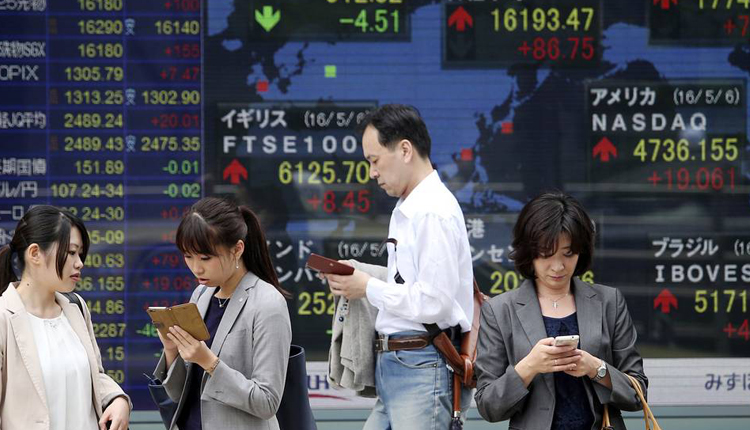Asian stocks traded cautiously on Tuesday, following the previous day’s rally, as new doubts emerged overnight about the partial U.S.-China trade deal.
In South Korea, the Kospi index added 0.15 percent. Japan’s Nikkei 225 jumped 1.76 percent and the Topix index added 1.73 percent after Japanese markets were closed Monday for a public holiday.
Chinese mainland markets fell in early trade: The Shanghai composite slipped 0.4 percent, the Shenzhen composite was down 0.6 percent and the Shenzhen component dropped 0.61 percent.
Pork prices in China jumped around 69 percent on-year in September due to ongoing shortage of the meat following an outbreak of African swine fever. Overall, the consumer price index was said to have increased 3% on-year last month while the producer price index fell by 1.2 percent.
Hong Kong’s Hang Seng index traded near flat.
Australia’s ASX 200 wavered between fractional gains and losses but changed little from the previous day’s levels. The heavily weighted financial subindex reversed declines to trade up 0.13 percent while the energy sector fell 0.9 percent and materials was down 1.15 percent.
Overnight, stocks closed slightly lower on Wall Street and declined in major European markets.
“We have started the new week in a more cautious mood with the US-China trade vibes now starting to show some signs of friction,” Rodrigo Catril, senior foreign-exchange strategist at the National Australia Bank, wrote in a morning note. “China wants more talk time to iron out details and it also wants the tariff stick to go away, but overnight comments from Treasury Secretary Steven Mnuchin suggests otherwise.”
China wants another round of talks before signing what U.S. President Donald Trump last week called “a very substantial phase one deal” between the two countries, a source told CNBC on Monday.
Last week, Trump announced the partial trade agreement that will address intellectual property and financial services concerns, along with purchases of about $40 billion to $50 billion worth of agricultural products by China.
For its part, the U.S. said it would hold off from raising tariffs this week on $250 billion worth of Chinese products from 25 percent to 30 percent. The next tariff deadline is Dec. 15. Mnuchin told CNBC on Monday he expects the mid-December round of tariffs to take effect if no deal is reached between the countries.
Meanwhile, Chinese state media also struck a cautious tone, warning the U.S. over the weekend to avoid backpedaling on the partial trade agreement.
“On the positive side there is still evidence from both side willingness to strike a deal,” Catril added.
Currencies
The dollar index, which measures the U.S. dollar against a basket of its peers, traded at 98.420, falling from an earlier high of 98.486.
Elsewhere, the Japanese yen, which is seen as a safe-haven currency, changed hands at 108.44, weakening from an earlier high of 108.28.
The Australian dollar traded at $0.6784, climbing from an earlier level of $0.6767. The Reserve Bank of Australia’s October policy meeting minutes were released, where the central bank left the door open for further rate cuts to reach full employment and achieve the inflation target over time.
Still, the RBA signaled its worry over rising house prices and said the situation required “close monitoring.” Earlier this month, the central bank slashed its cash rate by 25 basis points to a record low of 0.75 percent.
Source: CNBC


